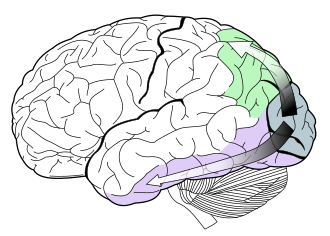Posterior cortical atrophy

Editor-In-Chief: Prab R Tumpati, MD
Obesity, Sleep & Internal medicine
Founder, WikiMD Wellnesspedia &
W8MD's medical weight loss NYC, sleep center NYC
Philadelphia medical weight loss and Philadelphia sleep clinics
| Posterior cortical atrophy | |
|---|---|

| |
| Synonyms | Benson's syndrome |
| Pronounce | N/A |
| Specialty | Neurology |
| Symptoms | Visual impairment, dyslexia, dysgraphia, dyscalculia, agnosia, apraxia |
| Complications | N/A |
| Onset | Typically between ages 50 and 65 |
| Duration | Progressive |
| Types | N/A |
| Causes | Neurodegenerative disease, often associated with Alzheimer's disease |
| Risks | Family history of dementia |
| Diagnosis | Neuropsychological test, MRI, PET scan |
| Differential diagnosis | Alzheimer's disease, Lewy body dementia, Creutzfeldt-Jakob disease |
| Prevention | N/A |
| Treatment | Symptomatic treatment, occupational therapy, vision therapy |
| Medication | N/A |
| Prognosis | Progressive decline |
| Frequency | Rare |
| Deaths | N/A |

Posterior cortical atrophy (PCA) is a rare, degenerative brain disorder that affects visual processing and other cognitive functions. It is often associated with Alzheimer's disease, but can also be linked to other neurological conditions.
Introduction[edit]
PCA is characterized by a progressive decline in visual processing abilities, including difficulties with reading, recognizing objects or faces, and judging distances. Despite these visual impairments, individuals with PCA typically retain good insight, memory, and social skills in the early stages of the disease.
Symptoms[edit]
The symptoms of PCA can vary widely between individuals, but often include:
- Agnosia: Difficulty recognizing objects, faces, or places
- Alexia: Difficulty reading
- Apraxia: Difficulty carrying out complex motor tasks
- Acalculia: Difficulty with arithmetic
- Visuospatial dysfunction: Difficulty judging distances or navigating spaces
Causes[edit]
PCA is most commonly associated with Alzheimer's disease, but can also be linked to other neurological conditions such as Corticobasal degeneration and Creutzfeldt-Jakob disease. The exact cause of PCA is unknown, but it is thought to be related to the degeneration of the posterior cortical regions of the brain.
Diagnosis[edit]
Diagnosis of PCA is based on clinical examination, neuropsychological testing, and brain imaging techniques such as MRI and PET scans. These tests can help to identify the characteristic patterns of brain atrophy associated with PCA.
Treatment[edit]
There is currently no cure for PCA, but treatments can help to manage symptoms and improve quality of life. These may include visual aids, occupational therapy, and medications to manage cognitive symptoms.
Prognosis[edit]
The progression of PCA can vary widely between individuals. Some people may remain relatively stable for several years, while others may experience a rapid decline in cognitive function.
See also[edit]
This rare disease-related article is a stub. You can help WikiMD by expanding it.
Ad. Transform your life with W8MD's Budget GLP-1 injections from $75


W8MD offers a medical weight loss program to lose weight in Philadelphia. Our physician-supervised medical weight loss provides:
- Weight loss injections in NYC (generic and brand names):
- Zepbound / Mounjaro, Wegovy / Ozempic, Saxenda
- Most insurances accepted or discounted self-pay rates. We will obtain insurance prior authorizations if needed.
- Generic GLP1 weight loss injections from $75 for the starting dose.
- Also offer prescription weight loss medications including Phentermine, Qsymia, Diethylpropion, Contrave etc.
NYC weight loss doctor appointmentsNYC weight loss doctor appointments
Start your NYC weight loss journey today at our NYC medical weight loss and Philadelphia medical weight loss clinics.
- Call 718-946-5500 to lose weight in NYC or for medical weight loss in Philadelphia 215-676-2334.
- Tags:NYC medical weight loss, Philadelphia lose weight Zepbound NYC, Budget GLP1 weight loss injections, Wegovy Philadelphia, Wegovy NYC, Philadelphia medical weight loss, Brookly weight loss and Wegovy NYC
|
WikiMD's Wellness Encyclopedia |
| Let Food Be Thy Medicine Medicine Thy Food - Hippocrates |
Medical Disclaimer: WikiMD is not a substitute for professional medical advice. The information on WikiMD is provided as an information resource only, may be incorrect, outdated or misleading, and is not to be used or relied on for any diagnostic or treatment purposes. Please consult your health care provider before making any healthcare decisions or for guidance about a specific medical condition. WikiMD expressly disclaims responsibility, and shall have no liability, for any damages, loss, injury, or liability whatsoever suffered as a result of your reliance on the information contained in this site. By visiting this site you agree to the foregoing terms and conditions, which may from time to time be changed or supplemented by WikiMD. If you do not agree to the foregoing terms and conditions, you should not enter or use this site. See full disclaimer.
Credits:Most images are courtesy of Wikimedia commons, and templates, categories Wikipedia, licensed under CC BY SA or similar.
Translate this page: - East Asian
中文,
日本,
한국어,
South Asian
हिन्दी,
தமிழ்,
తెలుగు,
Urdu,
ಕನ್ನಡ,
Southeast Asian
Indonesian,
Vietnamese,
Thai,
မြန်မာဘာသာ,
বাংলা
European
español,
Deutsch,
français,
Greek,
português do Brasil,
polski,
română,
русский,
Nederlands,
norsk,
svenska,
suomi,
Italian
Middle Eastern & African
عربى,
Turkish,
Persian,
Hebrew,
Afrikaans,
isiZulu,
Kiswahili,
Other
Bulgarian,
Hungarian,
Czech,
Swedish,
മലയാളം,
मराठी,
ਪੰਜਾਬੀ,
ગુજરાતી,
Portuguese,
Ukrainian